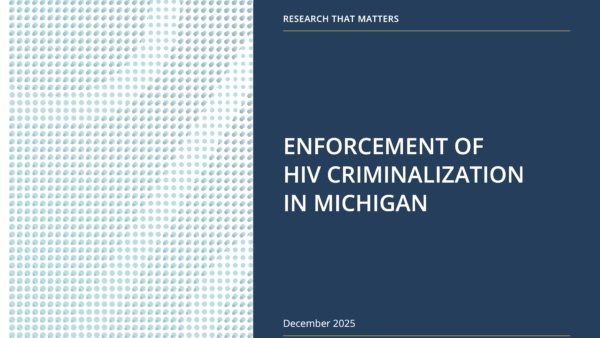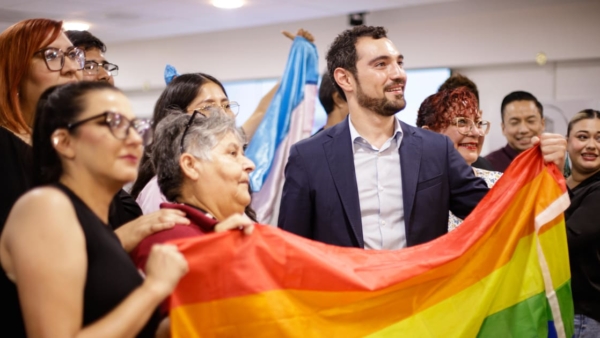
Op-ed: Failing Migrant Rights, Failing Public Health
Janet Butler-McPhee, Anne-Rachelle Boulanger, and Nadia Fyfe
Canada prides itself on being a welcoming country with a universal healthcare system — and is lauded for both around the world. But for people without citizenship, significant healthcare gaps exist and access is often barred. This is true for many people living with HIV who require antiretroviral therapy to treat the condition and ensure that it can’t be transmitted. Having marked World Hepatitis Day this month, we also know that many people living with hepatitis C (HCV) in Canada cannot access healthcare and face the needless prospect of liver damage, cancer, and even death without treatment. The status quo is unacceptable for those who wish to call Canada home, and for Canadians who understand the critical importance of public health and human rights.
Accurately determining the number of people without citizenship in Canada who are living with HIV, HCV, and other sexually transmitted and blood-borne infections is challenging. However, it is well-recognized that migrants are disproportionately affected by some of these conditions but may never have had access to treatment. Migrants account for roughly 30% of people living with HCV in Canada and 70% of those living with hepatitis B. In 2017, it was estimated that up to 500,000 people in Canada were living without health insurance, primarily due to their lack of citizenship. And with more and more people immigrating since then, we can assume that these numbers have now increased.
Accessing healthcare is a complicated ordeal for newcomers, as all provinces and territories have their own healthcare insurance plans. Most require people to have lived in their jurisdiction for six months to be eligible for healthcare, and then impose another three-month waiting period before coverage kicks in. In some jurisdictions, access is even further limited for people living with HIV, as antiretroviral therapy is only available at specific pharmacies, or coverage is only available with a specialist’s recommendation, even though those specialists already have lengthy waiting lists. These requirements delay access to essential healthcare and worsen outcomes.
Newcomers to Canada will, in most cases, pay out of pocket during these long waiting periods. In a 2023 study that looked at the impact of waiting periods in Ontario, 32% of participants reported delaying necessary healthcare for themselves or immediate family members due to lack of coverage. Media outlets have regularly reported on harms (both financial and otherwise) caused by such delays. One individual avoided getting gender-affirmative care. Another woman was charged $35,000 for a life-saving hospitalization. A couple was also denied an appointment with an obstetrician unless they paid $10,000 upfront. None of this bodes well for public health.
Access to healthcare is even more restricted for people without immigration status — a situation in which people often become trapped because of legal technicalities. People in this position cannot obtain status in Canada, nor are they afforded their basic human right to healthcare, as immigration status is required to access any public healthcare plan. We know that people living with HIV and HCV can be — and are — caught in this position, unable to access care critical to their well-being and survival. The United Nations has frequently called on Canada to ensure that our public healthcare is accessible to all people, regardless of their immigration status; the world may soon realize how “un-Canadian” some of our policies really are.
The Interim Federal Health Program (IFHP) attempts to fill some of these gaps by providing temporary healthcare coverage to refugee claimants, recognized refugees, and other protected persons in Canada. Through IFHP, these individuals should have access to the same coverage provided by the province or territory in which they live. But the program often fails to provide consistent access to essential healthcare to those in need, as noted by service providers. Following extensive cuts to the program in 2012, the Federal Court confirmed that the cuts put “lives at risk and… serve to perpetuate the historical disadvantage suffered by members of an admittedly vulnerable, poor and disadvantaged group.” Today, a change in political will could threaten its very existence. If we are really committed to protecting people in need, as we claim on the world stage, their access to healthcare should be a no-brainer.
Addressing the barriers non-citizens face in accessing treatment for HIV, HCV, and other health conditions isn’t just a matter of fairness — it’s a public health necessity. Canada must eliminate wait times for health insurance, increase funding for temporary healthcare coverage, and ensure provincial requirements do not hinder access to life-saving care. Only then will Canada have any hope of a truly universal healthcare system where no one is left behind.
Janet Butler-McPhee is a Co-Executive Director of the HIV Legal Network and a member of the steering committee of Action Hepatitis Canada.
Anne-Rachelle Boulanger is a Policy Analyst with the HIV Legal Network.
Nadia Fyfe is a law student at the University of Western Ontario.









